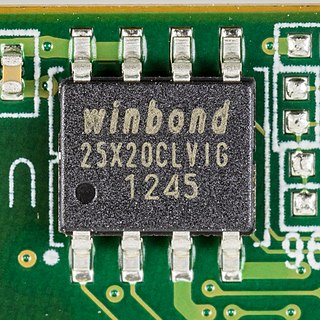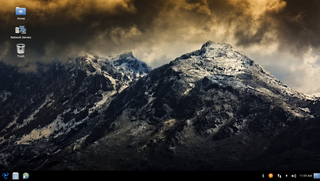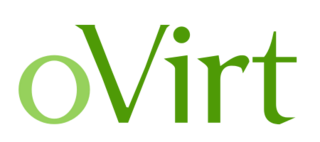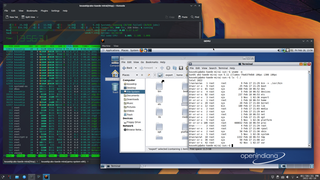The Open Network Install Environment (ONIE) is an open-source "install environment", that acts as an enhanced boot loader utilizing facilities in a Linux/BusyBox environment.
The Open Network Install Environment (ONIE) is an open-source "install environment", that acts as an enhanced boot loader utilizing facilities in a Linux/BusyBox environment.
This small Linux operating system allows end-users and channel partners to install a network operating system as part of data center provisioning, similar to the way servers are provisioned with an operating system of choice.
ONIE enables network switch hardware suppliers, distributors and resellers to manage their operations based on a small number of hardware stock keeping unit (SKUs). This in turn creates economies of scale in manufacturing, distribution, stocking, and return merchandise authorization (RMA) enabling an ecosystem of both network hardware and operating system alternatives.
ONIE was created by Cumulus Networks (now a part of NVIDIA) in 2012 before it was adopted by the Open Compute Project in 2013.

In the context of an operating system, a device driver is a computer program that operates or controls a particular type of device that is attached to a computer or automaton. A driver provides a software interface to hardware devices, enabling operating systems and other computer programs to access hardware functions without needing to know precise details about the hardware being used.

A Linux distribution is an operating system that includes the Linux kernel for its kernel functionality. Although the name does not imply product distribution per se, a distro, if distributed on its own, is often obtained via a website intended specifically for the purpose. Distros have been designed for a wide variety of systems ranging from personal computers to servers and from embedded devices to supercomputers.

In computing, firmware is software that provides low-level control of computing device hardware. For a relatively simple device, firmware may perform all control, monitoring and data manipulation functionality. For a more complex device, firmware may provide relatively low-level control as well as hardware abstraction services to higher-level software such as an operating system.
UNICOS is a range of Unix and later Linux operating system (OS) variants developed by Cray for its supercomputers. UNICOS is the successor of the Cray Operating System (COS). It provides network clustering and source code compatibility layers for some other Unixes. UNICOS was originally introduced in 1985 with the Cray-2 system and later ported to other Cray models. The original UNICOS was based on UNIX System V Release 2, and had many Berkeley Software Distribution (BSD) features added to it.

A Beowulf cluster is a computer cluster of what are normally identical, commodity-grade computers networked into a small local area network with libraries and programs installed which allow processing to be shared among them. The result is a high-performance parallel computing cluster from inexpensive personal computer hardware.

A live CD is a complete bootable computer installation including operating system which runs directly from a CD-ROM or similar storage device into a computer's memory, rather than loading from a hard disk drive. A live CD allows users to run an operating system for any purpose without installing it or making any changes to the computer's configuration. Live CDs can run on a computer without secondary storage, such as a hard disk drive, or with a corrupted hard disk drive or file system, allowing data recovery.
Nitix was a retail Linux distribution, produced in Canada. The software is developed by Net Integration Technologies, Inc., which has been acquired by IBM as of January 2008 and currently operates as IBM Lotus Foundations.
OS-level virtualization is an operating system (OS) virtualization paradigm in which the kernel allows the existence of multiple isolated user space instances, including containers, zones, virtual private servers (OpenVZ), partitions, virtual environments (VEs), virtual kernels, and jails. Such instances may look like real computers from the point of view of programs running in them. A computer program running on an ordinary operating system can see all resources of that computer. Programs running inside a container can only see the container's contents and devices assigned to the container.
A virtual appliance is a pre-configured virtual machine image, ready to run on a hypervisor; virtual appliances are a subset of the broader class of software appliances. Installation of a software appliance on a virtual machine and packaging that into an image creates a virtual appliance. Like software appliances, virtual appliances are intended to eliminate the installation, configuration and maintenance costs associated with running complex stacks of software.

Trisquel is a computer operating system, a Linux distribution, derived from another distribution, Ubuntu. The project aims for a fully free software system without proprietary software or firmware and uses a version of Ubuntu's modified kernel, with the non-free code removed. Trisquel relies on user donations. Its logo is a triskelion, a Celtic symbol. Trisquel is listed by the Free Software Foundation as a distribution that contains only free software.
Infrastructure as a service (IaaS) is a cloud computing service model where a cloud services vendor provides computing resources such as storage, network, servers, and virtualization. This service frees users from maintaining their own data center, but they must install and maintain the operating system and application software. Iaas provides users high-level APIs to control details of underlying network infrastructure such as backup, data partitioning, scaling, security and physical computing resources. Services can be scaled on-demand by the user. According to the Internet Engineering Task Force (IETF), such infrastructure is the most basic cloud-service model. IaaS can be hosted in a public cloud, a private cloud, or a hybrid cloud.

oVirt is a free, open-source virtualization management platform. It was founded by Red Hat as a community project on which Red Hat Virtualization is based. It allows centralized management of virtual machines, compute, storage and networking resources, from an easy-to-use web-based front-end with platform independent access. KVM on x86-64, PowerPC64 and s390x architecture are the only hypervisors supported, but there is an ongoing effort to support ARM architecture in a future releases.

In computing, virtualization (v12n) is a series of technologies that allows dividing of physical computing resources into a series of virtual machines, operating systems, processes or containers.

OpenStack is a free, open standard cloud computing platform. It is mostly deployed as infrastructure-as-a-service (IaaS) in both public and private clouds where virtual servers and other resources are made available to users. The software platform consists of interrelated components that control diverse, multi-vendor hardware pools of processing, storage, and networking resources throughout a data center. Users manage it either through a web-based dashboard, through command-line tools, or through RESTful web services.
Linaro is an engineering organization that works on free and open-source software such as the Linux kernel, the GNU Compiler Collection (GCC), QEMU, power management, graphics and multimedia interfaces for the ARM family of instruction sets and implementations thereof as well as for the Heterogeneous System Architecture (HSA). The company provides a collaborative engineering forum for companies to share engineering resources and funding to solve common problems on ARM software. In addition to Linaro's collaborative engineering forum, Linaro also works with companies on a one-to-one basis through its Services division.
Software-defined storage (SDS) is a marketing term for computer data storage software for policy-based provisioning and management of data storage independent of the underlying hardware. Software-defined storage typically includes a form of storage virtualization to separate the storage hardware from the software that manages it. The software enabling a software-defined storage environment may also provide policy management for features such as data deduplication, replication, thin provisioning, snapshots and backup.
DNOS or Dell Networking Operating System is a network operating system running on switches from Dell Networking. It is derived from either the PowerConnect OS or Force10 OS/FTOS and will be made available for the 10G and faster Dell Networking S-series switches, the Z-series 40G core switches and DNOS6 is available for the N-series switches.
Cumulus Networks was a computer software company headquartered in Mountain View, California, US. The company designed and sold a Linux operating system for industry standard network switches, along with management software, for large datacenter, cloud computing, and enterprise environments.
OpenLMI provides a common management infrastructure for Linux systems. Available operations include configuration of various operating system parameters and services, hardware components configuration, and monitoring of system resources. Services provided by OpenLMI can be accessed both locally and remotely, using multiple programming languages and standardized APIs.